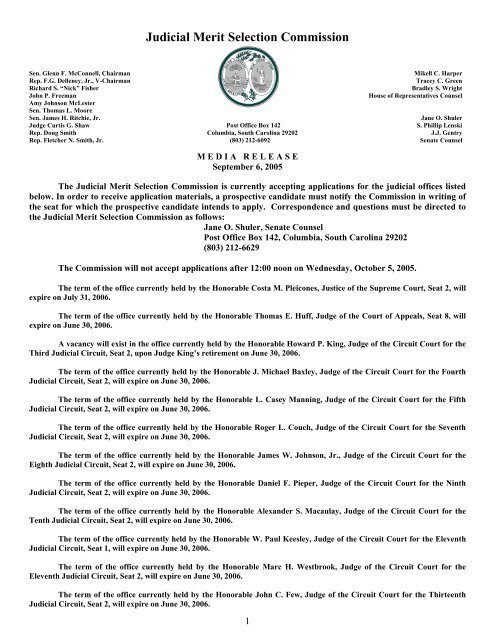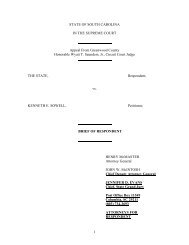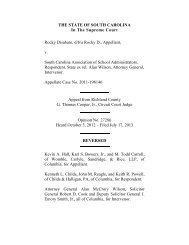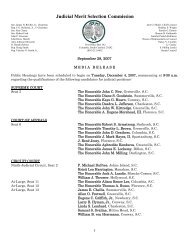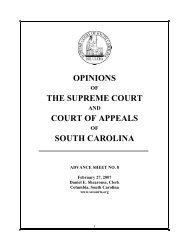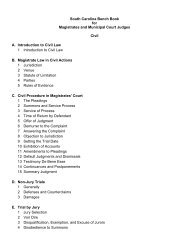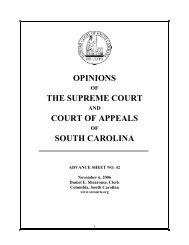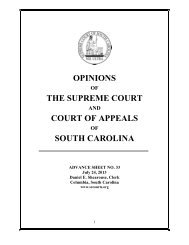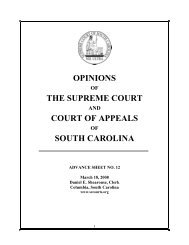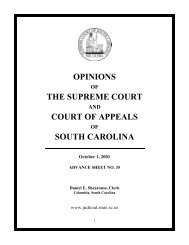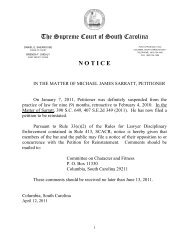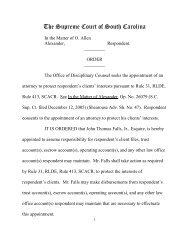Judicial Merit Selection Commission - SC Judicial Department
Judicial Merit Selection Commission - SC Judicial Department
Judicial Merit Selection Commission - SC Judicial Department
- No tags were found...
Create successful ePaper yourself
Turn your PDF publications into a flip-book with our unique Google optimized e-Paper software.
<strong>Judicial</strong> <strong>Merit</strong> <strong>Selection</strong> <strong>Commission</strong> Sen. Glenn F. McConnell, ChairmanMikell C. HarperRep. F.G. Delleney, Jr., V-ChairmanTracey C. GreenRichard S. “Nick” FisherBradley S. WrightJohn P. Freeman House of Representatives CounselAmy Johnson McLesterSen. Thomas L. MooreSen. James H. Ritchie, Jr.Jane O. ShulerJudge Curtis G. Shaw Post Office Box 142 S. Phillip LenskiRep. Doug Smith Columbia, South Carolina 29202 J.J. GentryRep. Fletcher N. Smith, Jr. (803) 212-6092 Senate CounselM E D I A R E L E A S ESeptember 12, 2005The <strong>Judicial</strong> <strong>Merit</strong> <strong>Selection</strong> <strong>Commission</strong> is currently accepting applications for the judicial officelisted below. In order to receive application materials, a prospective candidate must notify the<strong>Commission</strong> in writing that he/she intends to apply. Correspondence and questions may be directed tothe <strong>Judicial</strong> <strong>Merit</strong> <strong>Selection</strong> <strong>Commission</strong> as follows:Jane O. Shuler, Senate CounselPost Office Box 142Columbia, South Carolina 29202(803) 212-6629The <strong>Commission</strong> will not accept applications after 12:00 noon on Tuesday, October 11, 2005.A vacancy will exist in the office currently held by the Honorable Thomas W. Cooper, Jr., Judgeof the Circuit Court for the Third <strong>Judicial</strong> Circuit, Seat 1, upon Judge Cooper’s retirement on or beforeSeptember 30, 2006. The successor will fill the unexpired term of that office which will expire on June 30,2010.For further information about the <strong>Judicial</strong> <strong>Merit</strong> <strong>Selection</strong> <strong>Commission</strong> and the judicial screeningprocess, you may access the website at www.scstatehouse.net/html-pages/judmerit.html.* * *3
OPINIONS OF THE SUPREME COURT AND COURT OF APPEALS OFSOUTH CAROLINA ADVANCE SHEET NO. 35September 12, 2005Daniel E. Shearouse, ClerkColumbia, South Carolinawww.sccourts.org4
CONTENTSTHE SUPREME COURT OF SOUTH CAROLINAPUBLISHED OPINIONS AND ORDERS26037 - Octavia Jackson v. Swordfish Investments, LLCPage19NoneUNPUBLISHED OPINIONSPETITIONS - UNITED STATES SUPREME COURT2004-OR-00860 - Bernie J. E. Dingle v. Elaine Dobson2004-OR-01115 - S.C. Dept. of Social Services v. Diana and John Holden25886 - State v. Bobby Lee Holmes25920 - State v. Jonathan Kyle BinneyPendingPendingPendingPendingPETITIONS FOR REHEARING26019 - Jennifer Cape v. Greenville County School District Denied 09/13/0526020 - Willie David, et al. v. McLeod Regional Medical Center, et al. Granted 09/13/0526022 - Strategic Resources Co., et al. v. BCS Life Insurance Co., et al. Pending26035 - Linda Gail Marcum v. Donald Mayon Bowden, et al. Pending26027 - State v. Brenda Gail Cutro Pending26031 - Tom Anderson v. The Augusta Chronicle Pending2005-MO-039 - John K. Moore v. StatePendingPETITION TO FILE PETITION FOR REHEARING OUT OF TIME26014 - Edward Sloan v. <strong>Department</strong> of Transportation PendingEXTENSION OF TIME TO FILE PETITION FOR REHEARING2005-MO-038 - Mekiel Mitchell v. StatePending5
THE SOUTH CAROLINA COURT OF APPEALSPUBLISHED OPINIONSPage4023-Joseph Mark Clark, Sr. v. Aiken County Government & South 28Carolina Property and Casualty Insurance Guaranty Association,formerly Legion Insurance Company4024-Thomas Henry Stinecipher and Hipolita Viego Stineciper v. Thomas 41Ray Ballington and Christopher Austin Ballington, a minor under theage of ten (10) yearsUNPUBLISHED OPINIONS2005-UP-506-Furman Dabbs & Dabbs Incorporated v. William R. Davis et al.(Greenville, Judge John C. Few)2005-UP-507-Vernon C. Cook v. Wilma C. Kay(Horry, Judge J. Stanton Cross, Jr.)2005-UP-508-Dawn Brewer v. Myrtle Beach Farms Company Inc. d/b/a MyrtleBeach Pavilion et al.(Horry, Judge John L. Breeden, Jr.)2005-UP-509-Frankie Bales and Sandra Bales v. Robert Judelsohn(Charleston, Judge Thomas L. Hughston, Jr.)2005-UP-510-The State v. Gregory Tucker(Florence, Judge J. Michael Baxley)2005-UP-511-The State v. Sedric Govan a/k/a Cedric Green(York, Judge Howard P. King)2005-UP-512-The State v. Eric Eugene Douglas(York, Judge Roger L. Couch)2005-UP-513-The State v. Jody Jackson(Spartanburg, Judge J. Derham Cole)6
2005-UP-514-Theresa Russell v. Christopher Aumick(Horry, Judge H.E. Bonnoitt, Jr.)2005-UP-515-The State v. Augustus Dante McBeth(Richland, Judge G. Thomas Cooper, Jr.)PETITIONS FOR REHEARING3956-State v. Light Pending3982-LoPresti v. Burry Denied 08/29/053990-Cowburn v. Leventis Denied 08/29/053993-Thomas v. Lutch (Stevens) Denied 08/29/053995-Cole v. Raut Denied 08/29/053998-Anderson v. Buonforte Denied 08/29/053999-Roberts v. McNair Law FirmPending4000-Alexander v. Forklifts Unlimited Denied 08/29/054001-Keith v. River Consulting Denied 08/29/054011-State v. Nicholson4014-State v. D. Wharton4015-Collins Music Co. v. IGT4018-Wellman v. Square D4019-Longshore v. SaberPendingPendingPendingPendingPending4020-Englert Inc. v. LeafGuard USA Pending4021-<strong>SC</strong>DSS v. PhillipsPending2005-UP-197-State v. Cowan Denied 08/29/057
2005-UP-469-In the interest of S., Jackie2005-UP-471-Whitworth v. Window World2005-UP-472-Roddey v. NationsWaste et al.2005-UP-474-State v. S. HillPendingPendingPendingPending2005-UP-483-State v. A. Collins Pending2005-UP-486-Hunter v. Chester Co. Council et al.2005-UP-490-Widdicombe v. Dupree2005-UP-498-Quick v. HunsuckerPendingPendingPendingPETITIONS - SOUTH CAROLINA SUPREME COURT3724-State v. Pagan Pending3730-State v. AndersonPending3744-Angus v. Burroughs & Chapin Granted08/26/053745-Henson v. International (H. Hunt) Pending3750-Martin v. Companion Health Denied 08/26/053751-State v. Barnett Denied 08/26/053758-Walsh v. Woods Pending3772-State v. Douglas3775-Gordon v. Drews3776-Boyd v. Southern Bell3777-State v. ChildersPendingPendingPendingPending3779-Home Port v. Moore Pending9
3780-Pope v. Gordon3787-State v. HortonPendingPending3790-State v. Reese Pending3794-State v. Pipkin Pending3795-State v. Hill Granted 08/26/053800-Ex parte Beard: Watkins v. Newsome Pending3808-Wynn v. Wynn3809-State v. BelvisoPendingPending3810-Bowers v. <strong>SC</strong>DOT Pending3813-Bursey v. <strong>SC</strong>DHEC & <strong>SC</strong>E&G Pending3820-Camden v. Hilton3821-Venture Engineering v. Tishman3825-Messer v. Messer3830-State v. RobinsonPendingPendingPendingPending3832-Carter v. U<strong>SC</strong> Pending3833-Ellison v. Frigidaire Home ProductsPending3835-State v. Bowie Pending3836-State v. GillianPending3841-Stone v. Traylor Brothers Pending3842-State v. Gonzales Pending3843-Therrell v. Jerry’s Inc.Pending10
3847-Sponar v. <strong>SC</strong>DPS3848-Steffenson v. Olsen3849-Clear Channel Outdoor v. City of Myrtle Beach3850-<strong>SC</strong> Uninsured Employer’s v. House3851-Shapemasters Golf Course Builders v. Shapemasters, Inc.3852-Holroyd v. RequaPendingPendingPendingPendingPendingPending3853-McClain v. Pactiv Corp. Pending3855-State v. Slater Pending3857-Key Corporate v. County of Beaufort3858-O’Braitis v. O’BraitisPendingPending3860-State v. Lee Pending3861-Grant v. Grant Textiles et al.Pending3863-Burgess v. Nationwide Pending3864-State v. Weaver Pending3865-DuRant v. <strong>SC</strong>DHEC et alPending3866-State v. Dunbar Pending3871-Cannon v. <strong>SC</strong>DPPPS Pending3877-B&A Development v. Georgetown Cty.3879-Doe v. Marion (Graf)3883-Shadwell v. Craigie3884-Windsor Green v. Allied Signal et al.PendingPendingPendingPending11
3890-State v. BroaddusPending3900-State v. Wood Pending3903-Montgomery v. CSX TransportationPending3906-State v. James Pending3910-State v. Guillebeaux3911-Stoddard v. Riddle3912-State v. Brown3914-Knox v. Greenville HospitalPendingPendingPendingPending3917-State v. Hubner Pending3918-State v. N. Mitchell3919-Mulherin et al. v. Cl. Timeshare et al.PendingPending3926-Brenco v. <strong>SC</strong>DOT Pending3928-Cowden Enterprises v. East Coast3929-Coakley v. Horace Mann3935-Collins Entertainment v. White3936-Rife v. Hitachi Construction et al.3938-State v. E. Yarborough3939-State v. R. JohnsonPendingPendingPendingPendingPendingPending3940-State v. H. Fletcher Pending3943-Arnal v. Arnal Pending3947-Chassereau v. Global-Sun Pools Pending12
3949-Liberty Mutual v. S.C. Second Injury FundPending3950-State v. Passmore Pending3952-State v. K. Miller3954-Nationwide Mutual Ins. v. Erwood3963-McMillan v. <strong>SC</strong> Dep’t of Agriculture3965-State v. McCallPendingPendingPendingPending3966-Lanier v. Lanier Pending3968-Abu-Shawareb v. S.C. State University3971-State v. Wallace3976-Mackela v. Bentley3977-Ex parte: USAA In Re: Smith v. Moore)PendingPendingPendingPending3978-State v. K. Roach Pending3981-Doe v. <strong>SC</strong>DDSN et al.3984-Martasin v. Hilton Head3985-Brewer v. Stokes Kia3988-Murphy v. Jefferson Pilot3989-State v. Tuffour2003-UP-642-State v. MoyersPendingPendingPendingPendingPendingPending2003-UP-716-State v. Perkins Pending2003-UP-736-State v. Ward2003-UP-757-State v. JohnsonPendingPending13
2004-UP-110-Page v. Page Pending2004-UP-219-State v. BrewerPending2004-UP-237-In the interest of B., Justin Pending2004-UP-247-Carolina Power v. Lynches River Electric Denied 08/26/052004-UP-251-State v. Davis Pending2004-UP-256-State v. Settles2004-UP-271-Hilton Head v. Bergman2004-UP-289-E. Hathaway Const. v. Eli2004-UP-336-Clayton v. Lands Inn, Inc.2004-UP-344-Dunham v. Coffey2004-UP-346-State v. Brinson2004-UP-356-Century 21 v. Benford2004-UP-359-State v. Hart2004-UP-362-Goldman v. RBC, Inc.2004-UP-366-Armstong v. Food Lion2004-UP-371-Landmark et al. v. Pierce et al.2004-UP-381-Crawford v. Crawford2004-UP-394-State v. Daniels2004-UP-397-Foster v. Greenville MemorialPendingPendingPendingPendingPendingPendingPendingPendingPendingPendingPendingPendingPendingPending2004-UP-407-Small v. Piper Pending2004-UP-409-State v. MoyersPending14
2004-UP-555-Rogers v. Griffith2004-UP-556-Mims v. Meyers2004-UP-560-State v. Garrard2004-UP-596-State v. Anderson2004-UP-598-Anchor Bank v. Babb2004-UP-600-McKinney v. McKinney2004-UP-605-Moring v. Moring2004-UP-606-Walker Investment v. Carolina First2004-UP-607-State v. RandolphPendingPendingPendingPendingPendingPendingPendingPendingPending2004-UP-609-Davis v. Nationwide Mutual Pending2004-UP-610-Owenby v. Kiesau et al. Pending2004-UP-613-Flanary v. Flanary2004-UP-617-Raysor v. StatePendingPending2004-UP-632-State v. Ford Pending2004-UP-635-Simpson v. Omnova Solutions2004-UP-650-Garrett v. Est. of Jerry Marsh2004-UP-653-State v. R. Blanding2004-UP-654-State v. Chancy2004-UP-657-<strong>SC</strong>DSS v. Cannon2004-UP-658-State v. Young2005-UP-001-Hill v. Marsh et al.PendingPendingPendingPendingPendingPendingPending16
2005-UP-002-Lowe v. Lowe Pending2005-UP-014-Dodd v. Exide Battery Corp. et al.2005-UP-016-Averette v. BrowningPendingPending2005-UP-018-State v. Byers Pending2005-UP-022-Ex parte DunaginPending2005-UP-023-Cantrell v. <strong>SC</strong>DPS Pending2005-UP-039-Keels v. PostonPending2005-UP-046-CCDSS v. Grant Pending2005-UP-054-Reliford v. SussmanPending2005-UP-058-Johnson v. Fort Mill Chrysler Pending2005-UP-113-McCallum v. Beaufort Co. Sch. Dt.2005-UP-115-Toner v. <strong>SC</strong> Employment Sec. Comm’n2005-UP-116-S.C. Farm Bureau v. Hawkins2005-UP-122-State v. K. Sowell2005-UP-124-Norris v. Allstate Ins. Co.2005-UP-128-Discount Auto Center v. Jonas2005-UP-130-Gadson v. ECO Services2005-UP-138-N. Charleston Sewer v. Berkeley County2005-UP-139-Smith v. Dockside Association2005-UP-149-Kosich v. Decker Industries, Inc.2005-UP-155-CCDSS v. KingPendingPendingPendingPendingPendingPendingPendingPendingPendingPendingPending17
2005-UP-160-Smiley v. <strong>SC</strong>DHEC/OCRM Pending2005-UP-165-Long v. LongPending2005-UP-170-State v. Wilbanks Pending2005-UP-171-GB&S Corp. v. Cnty. of Florence et al.2005-UP-173-DiMarco v. DiMarco2005-UP-174-Suber v. SuberPendingPendingPending2005-UP-192-Mathias v. Rural Comm. Ins. Co. Pending2005-UP-195-Babb v. FloydPending2005-UP-200-Cooper v. Permanent General Pending2005-UP-216-Hiott v. Kelly et al.2005-UP-219-Ralphs v. Trexler (Nordstrom)PendingPending2005-UP-224-Dallas et al. v. Todd et al. Pending2005-UP-296-State v. B. Jewell2005-UP-297-Shamrock Ent. v. The Beach Market2005-UP-298-Rosenblum v. Carbone et al.2005-UP-303-Bowen v. BowenPendingPendingPendingPending2005-UP-337-Griffin v. White Oak Prop. Pending2005-UP-348-State v. L. StokesPending18
THE STATE OF SOUTH CAROLINA In The Supreme Court Octavia Jackson,Appellant,v.Swordfish Investments, L.L.C., Respondent.__________Appeal From Richland CountyJ. Ernest Kinard, Jr., Circuit Court Judge__________Opinion No. 26037Heard June 2, 2005 - Filed September 6, 2005___________AFFIRMED___________Carl L. Solomon, of Gergel, Nickles & Solomon, P.A. and TonyDessausure, of The Dessausure Law Firm, both of Columbia, forAppellant.J. R. Murphy and Adam J. Neil, both of Murphy & Grantland, P.A.,of Columbia, for Respondent.___________19
JUSTICE BURNETT: This is a negligence action against acommercial landlord arising out of a shooting which occurred inside theleased premises. The trial court granted the landlord’s motion for summaryjudgment. We certified the case from the Court of Appeals pursuant to Rule204(b), <strong>SC</strong>ACR. We affirm.FACTUAL/PROCEDURAL BACKGROUNDRonald O. Swinson, Jr. and his wife each own a fifty-percentshare of Swordfish Investments, LLC (“Swordfish”), a limited liabilitycompany which Swinson set up to own real estate. Swinson is employed byC.B. Richard Ellis, a commercial real estate and brokerage firm. 1 C.B.Richard Ellis is the leasing agent for properties owned by Swordfish.Swordfish owns the Columbia East Shopping Center inColumbia. Uptop Management , Inc. (“Uptop”), a South Carolinacorporation, leased a portion of the shopping center for use as a nightclub.The lease dated December 21, 2000, was signed by Swinson on behalf ofSwordfish and by Pearl Ingram on behalf of Uptop. Swinson testified hebelieved Uptop subsequently entered into a management agreement withDance, Inc. (“Dance”) over its portion of the shopping center during the termof Uptop’s lease. When operated by Dance, Uptop’s nightclub was knownby various names, including Club Voodoos.During the operation of the various nightclub establishments inUptop’s leased portion of the shopping center, numerous crimes, includingnarcotics violations, assaults, and various instances of disorderly conduct,were committed on the premises. Ingram requested security be provided byeither Swordfish or C.B. Richard Ellis on Swordfish’s behalf. Swordfishagreed to provide security in the common areas, first by employing off-dutydeputies and later employing a private security company.1 Swinson is a partner in C.B. Richard Ellis and is employed torun the overall operations of the company. He is not a commercial real estatebroker.20
Larry Capall, director of property management for C.B. RichardEllis, testified Swordfish switched from the off-duty officers to the privatesecurity company because the club owners complained about the cost toemploy the off-duty deputies. Although Swordfish arranged for the securityin the common areas, it charged the tenants for the cost of maintaining thesecurity. Swordfish considered security “additional rents” under the lease tobe paid by the tenant. Prior to November 3, 2001, Swordfish, because of thefailure of payment by Uptop, discontinued the security in the common areas.On November 3, 2001, Octavia M. Jackson (Appellant) andseveral friends entered Club Voodoos. While Appellant was in the club, twoaltercations occurred. One involved a male patron who was escorted fromthe club. Soon thereafter Appellant and her party decided to leave and beganexiting the club. At that time, the male patron re-entered the club with a gunand began shooting in the air and indiscriminately into the crowd. Appellantwas shot multiple times.Appellant argues Swordfish had a duty to protect her from thecriminal activity in the club by providing adequate security on or in thevicinity of the property where Appellant was shot. The trial court grantedSwordfish’s motion for summary judgment.ISSUEDid the trial court err in granting Swordfish’s motion forsummary judgment?STANDARD OF REVIEWSummary judgment is appropriate when it is clear that there is nogenuine issue of material fact and that the moving party is entitled tojudgment as a matter of law. Café Assocs., Ltd. v. Gerngross, 305 S.C. 6,406 S.E.2d 162 (1991). Summary judgment is not appropriate where furtherinquiry into the facts of the case is desirable to clarify the application of thelaw. Middleborough Horizontal Property Regime Council of Co-Owners v.Montedison, 320 S.C. 470, 465 S.E.2d 765 (Ct. App. 1995). Further,summary judgment should not be granted even when there is no dispute as to21
the evidentiary facts, if there is a dispute as to the conclusion to be drawntherefrom. MacFarlane v. Manly, 274 S.C. 392, 264 S.E.2d 838 (1980). Anappellate court reviews the granting of summary judgment under the samestandard applied by the trial court. George v. Fabri, 345 S.C. 440, 548 S.E.2d868 (2001).LAW/ANALYSISIn a negligence action, a plaintiff must show the (1) defendantowed a duty of care to the plaintiff (2) defendant breached the duty by anegligent act or omission (3) defendant’s breach was the actual andproximate cause of the plaintiff’s injury and (4) the plaintiff suffered injuryor damages. Dorrell v. South Carolina Dept. of Transp., 361 S.C. 312, 318,605 S.E.2d 12, 15 (2004). Whether the law recognizes a particular duty is anissue of law to be determined by the court. Ellis v. Niles, 324 S.C. 223, 479S.E.2d 47 (1996).Appellant argues the trial court erred in concluding Swordfishhad no duty to protect her from the criminal acts of her assailant inside theleased premises. We disagree.In Cramer v. Balcor Property Management, Inc., 312 S.C. 440,441 S.E.2d 317 (1994), we concluded, on a certified question from thefederal district court, that residential landlords do not owe a general duty toprotect tenants from criminal activity of third parties. We agreed with thefederal district court opinion in Cooke v. Allstate Management Corp., 741F.Supp. 1205 (D.S.C. 1990), which found the residential landlord/tenantrelationship to be fundamentally different from the relationships for whichSouth Carolina law will impose a duty to protect against criminal activity.In the present case, Appellant argues that as the sub-lessee’sinvitee, Swordfish had a common law duty to protect her from the criminalacts of a third party. Appellant’s status as an invitee does not, under the factsof this case, create a duty on the part of Swordfish to protect her from the22
criminal acts of third parties inside the leased premises, an area whichSwordfish did not control or possess. 2In Cramer, we explained that even though South Carolina lawdoes not impose a duty on a landlord to protect a tenant from the criminalacts of third parties, a plaintiff is not precluded from asserting a generalnegligence principle. A duty may arise under the particular circumstances ofan individual case based upon a showing of negligence constituting theproximate cause of the loss, even though the law does not impose a generalduty on landlords to protect tenants or their guests from the criminal acts ofthird parties. Cramer, 312 S.C. at 443, 441 S.E.2d at 319.Appellant argues the applicability of two exceptions to thetraditional rule of non-liability of landlords. The exceptions are the“affirmative acts” exception and the “common areas” exception. Weconclude neither exception is applicable in this case.Under the common law, even where there is no duty to act but thedefendant voluntarily undertakes the act, the defendant assumes a duty to usedue care. Russell v. City of Columbia, 305 S.C. 86, 406 S.E.2d 338 (1991).Appellant argues that once Swordfish acted to provide security, it wasobligated to maintain adequate security.Although Swordfish agreed to arrange for security in thecommon areas at the tenant’s expense, there is no evidence in the recordSwordfish ever agreed to provide security inside the club. Swordfish hadneither possession nor control over the activities inside the club whenAppellant was shot. Therefore, no duty arose, under the affirmative acts2 Appellant argues Cramer is inapposite because Swordfish is acommercial landlord and Cramer addressed a landlord’s duty only in theresidential setting. We decline to address the issue of a commerciallandlord’s duty under the facts of this case, in which the crime occurredinside leased premises not under the landlord’s control, and Appellantpresented no evidence of any alleged criminal or suspicious activityoccurring in areas under the landlord’s control.23
exception, on the part of Swordfish to protect its tenants or their patrons fromthe criminal acts of third parties occurring inside the club.Appellant next argues Swordfish, as owner of the property, had aduty to maintain common areas in a safe and secure manner. BecauseAppellant’s assailant was able to re-enter the club, Appellant arguesSwordfish breached its duty under the common areas exception.In a case presenting different facts, we might well agree with thedissent that a commercial landlord has a duty to reasonably protect inviteesfrom foreseeable criminal acts in areas under the commercial landlord’scontrol. Assuming, without deciding, Swordfish had a duty under the lease toprovide security in the common areas, Appellant has failed to present anyevidence demonstrating a breach of this duty. Appellant has presented noevidence of any alleged criminal or suspicious activity occurring outside theclub before Appellant’s assailant re-entered the club. There simply is noevidence in the record suggesting the assailant’s activities outside the clubwould have alerted security personnel in the common areas of the assailant’simpending criminal conduct inside the club.Finally, our resolution of this issue is dispositive and we need notaddress Appellants’ remaining issues regarding proximate causation.Whiteside v. Cherokee County School Dist. No. One, 311 S.C. 335, 428S.E.2d 886 (1993) (appellate court need not address remaining issue whenresolution of prior issue is dispositive).AFFIRMED.MOORE and WALLER, JJ., concur. PLEICONES, J., dissents ina separate opinion in which TOAL, C.J., concurs.24
JUSTICE PLEICONES: I respectfully dissent. In my opinion,Swordfish had a duty to reasonably secure the common areas of the premises,and there are genuine issues of material fact concerning breach and causation.By emphasizing the fact that Appellant was injured inside the club, anarea over which Swordfish purportedly had no control, the majority avoidsAppellant’s argument that Swordfish had a duty to provide reasonablesecurity measures in the common areas outside the nightclub, which wereunder Swordfish’s control, and that the failure to do so allowed the assailantto return to the club and injure Appellant. That Appellant was shot inside theclub relates to causation, which in my opinion, is not here a proper element ofnegligence on which to base summary judgment.I agree with Appellant that a commercial landlord, under circumstanceshere appearing, has a duty to reasonably protect invitees from foreseeablecriminal acts in areas under the landlord’s control. Compare Cramer v.Balcor Prop. Mgmt., Inc., 312 S.C. 440, 441 S.E.2d 317 (1994) (holding thata residential landlord has no duty to protect invitees from foreseeablecriminal acts), with Bullard v. Ehrhardt, 283 S.C. 557, 559, 324 S.E.2d 61, 62(1984) (holding that a store owner has a duty to protect invitees fromforeseeable criminal acts), and Munn v. Hardee’s Food Sys., Inc., 274 S.C.529, 531, 266 S.E.2d 414, 414-15 (1980) (same), and Shipes v. PigglyWiggly St. Andrews, Inc., 269 S.C. 479, 484, 238 S.E.2d 167, 169 (1977)(same).Swordfish is a commercial landlord which expects members of thegeneral public to utilize the common areas as patrons of Swordfish’s tenants.If a landlord like Swordfish should reasonably anticipate that the payingpublic will be exposed to society’s criminal element, then it is appropriatethat the landlord be expected to take measures to protect the patrons. As theparty in control of the common areas, the landlord is in the best position tobear the burden with respect to those areas. See Cramer, 312 S.C. at 442-43,441 S.E.2d at 318-319 (distinguishing store owners, who invite the generalpublic to their premises, from residential landlords, who do not invite thegeneral public to their premises) (relying on Cooke v. Allstate Mgmt. Corp.,741 F. Supp. 1205 (D.S.C. 1990)).25
The question, then, is whether Swordfish should have foreseen criminalbehavior taking place in the common areas of its property. The evidence inthe record is overwhelming that long before Appellant was shot, drug use,violence, and other criminal behavior were rampant in the common areassurrounding the nightclub. Swordfish was fully aware of the situation, and Iwould therefore hold that a duty to reasonably secure the common areas aroseprior to the shooting at issue.A jury 3 must determine whether Swordfish breached its duty afterconsidering evidence relating to what security measures, if taken, would havefulfilled that duty. I find summary judgment not properly based on thiselement of negligence.Likewise, there remain for further factual development matters relatingto causation. Assuming a breach of Swordfish’s duty in the common areas, itremains to be determined whether such breach was a proximate cause of theassailant’s access to the club while armed.Further, I disagree with the circuit court that proximate cause is absentas a matter of law. The circuit court held that there was no question but thatthe shooting was an unforeseeable, intervening act that broke the causal linkbetween any breach by Swordfish and Appellant’s injury. This determinationis irreconcilable with Swordfish’s duty arising from the foreseeability ofcriminal conduct. Like the presence of cause in fact, the presence ofproximate cause would depend on the jury’s decision on breach. It isimpossible at this point to determine as a matter of law that a breach bySwordfish did not cause Appellant’s injury.On these grounds, the grant of summary judgment to Swordfish shouldbe reversed, and the case remanded for trial.In addition, and notwithstanding the previous discussion, the case mustbe remanded for a determination whether Swordfish had a contractual duty to3 In her complaint, Appellant requested a jury trial.26
secure the common areas. Appellant argued to the circuit court and thisCourt that Swordfish assumed such a duty in its lease with Up-Top. Thecircuit court did not interpret the lease, however, because the court held thatAppellant’s “negligence claim [could not] lie if it [were] based on a breach ofcontract between Swordfish and Up-Top in the absence of a duty independentof the contract.” This was error. Even when a duty to the plaintiff does nototherwise exist, a duty may arise out of the alleged tortfeasor’s contract witha third party. Andrade v. Johnson, 356 S.C. 238, 245, 588 S.E.2d 588, 592(2003). Accordingly, the grant of summary judgment should be reversed andthe case remanded so that the circuit court can interpret the lease. Were thecourt to find that the lease imposed a duty on Swordfish, then breach andcausation would depend on the nature and extent of that contractual duty,which could differ from the common-law duty discussed above.For the reasons I have stated, I would reverse the grant of summaryjudgment and remand the case for trial.TOAL, C.J., concurs27
THE STATE OF SOUTH CAROLINA In The Court of Appeals Joseph Mark Clark, Sr.,Respondent,Aiken County Government &South Carolina Property andCasualty Insurance GuarantyAssociation, formerly LegionInsurance Company,v.Appellants.__________Appeal from Aiken County James R. Barber, Circuit Court Judge __________Opinion No. 4023 Heard June 7, 2005 – Filed September 12, 2005 __________AFFIRMED__________Mark D. Cauthen and R. Daniel Addison, both ofColumbia, and David A. Wilson and Michael AllenFarry, both of Greenvile, for Appellants.Franklin D. Beattie, Jr., of Georgetown, forRespondent.28
CURETON, A.J.: This is a workers’ compensation case involving anaward based on change of condition. The Workers’ Compensation<strong>Commission</strong> found that Joseph Mark Clark, Sr. sustained a change ofphysical condition resulting in permanent and total disability, and the circuitcourt affirmed. We affirm as well.FACTSThe parties stipulated that Clark sustained an injury on July 12, 1999 inan accident arising out of and in the course of his employment with AikenCounty. Clark twisted his lower back while attempting to unhook a trailerfrom a vehicle. The parties also stipulated to an average weekly wage andcompensation rate.In the original proceeding, the single commissioner found Clarkreached MMI on January 20, 2000 and that he had sustained a 30%permanent partial disability as a result of the accident. He awarded benefitsaccordingly. Clark then appealed to the full commission. In his brief to thefull commission, he requested, inter alia, that Dr. Martin Greenberg bedesignated his treating physician “to provide alternative medical treatment.”While the case was pending before the full commission, Clark’s painincreased. Clark was seen by Dr. John Downey who, along with Clark’sattorney, referred him to Dr. Greenberg. Dr. Greenberg recommendedsurgery to Clark’s back and performed the surgery on July 27, 2001. Clarkdid not get permission from the County for Dr. Greenberg to treat him orperform the surgery.On August 10, 2001 the County tendered and Clark in turn acceptedpayment of the monetary benefits awarded by the single commissioner.On October 9, 2001, the full commission affirmed the singlecommissioner’s order, adopting verbatim his findings of fact and conclusionsof law. The full commission did not address the issue of whether Clark’scondition had changed since he reached MMI, nor did the full commission29
address the request in Clark’s brief that Greenberg be appointed his treatingphysician.The surgery successfully alleviated Clark’s pain for about four to sixmonths. Then the pain returned, although it was not as severe. Afterexamining Clark again, Dr. Greenberg determined that Clark waspermanently vocationally disabled. Clark has not worked since March of2000 when the County retired him based on disability.In January 2002, Clark filed a Form 50 claiming a substantial change ofcondition. The single commissioner concluded that Clark sustained aworsening of his condition and had an impairment of more than 51% to hisback. The single commissioner further concluded that the change in physicalcondition occurred after August 14, 2001. Accordingly, he awarded Clarkbenefits for total and permanent disability. The single commissioner alsospecifically found that the treatment by Dr. Greenberg was “necessary,reasonable and was an attempt to lessen [Clark’s] disability.” He ordered theCounty to pay for all past and continuing treatment provided to him.The County appealed to the full commission, which again affirmed,adopting the findings and conclusions of the single commissioner. Thecircuit court also affirmed. This appeal followed.STANDARD OF REVIEWThe South Carolina Administrative Procedures Act governs judicialreview of a decision of an administrative agency. S.C. Code Ann. §§ 1-23-310 to 400 (Supp. 2004). Section 1-23-380(A)(6) establishes the substantialevidence rule as the standard of review. Lark v. Bi-Lo, Inc., 276 S.C. 130,134, 276 S.E.2d 304, 306 (1981). Under this standard, a reviewing court mayreverse or modify an agency decision based on errors of law, but may onlyreverse or modify an agency’s findings of fact if they are clearly erroneous.S.C. Code Ann. § 1-23-380(A)(6)(d) and (e).Accordingly, a reviewing court may not substitute its judgment for thatof the full commission as to the weight of the evidence on questions of fact.30
Stephens v. Avins Constr. Co., 324 S.C. 334, 337, 478 S.E.2d 74, 76 (Ct.App. 1996). Instead, review of issues of fact is limited to determiningwhether the findings are supported by substantial evidence in the record.Hargrove v. Titan Textile Co., 360 S.C. 276, 289, 599 S.E.2d 604, 610-11(Ct. App. 2004). “On appeal, this court must affirm an award of theWorkers’ Compensation <strong>Commission</strong> in which the circuit court concurred ifsubstantial evidence supports the findings.” Solomon v. W.B. Easton, Inc.,307 S.C. 518, 520, 415 S.E.2d 841, 843 (Ct. App. 1992). “Substantialevidence is evidence which, considering the record as a whole, would allowreasonable minds to reach the conclusion that the administrative agencyreached to justify its action.” Howell v. Pacific Columbia Mills, 291 S.C.469, 471, 354 S.E.2d 384, 385 (1987).LAW/ANALYSISI. Change of ConditionThe County’s first contention on appeal is that Clark failed to prove achange of condition entitling him to additional compensation. Specifically,the County argues that because the change of condition asserted by Clarkoccurred before the full commission issued its order in the initial proceeding,the change could not have occurred subsequent to the first award. Wedisagree.Initially, Clark argues that the County failed to preserve this argumentfor appeal. In its request for review by the full commission, the Countystated as grounds for appeal, in relevant part, that the single commissionererred in finding as a fact and concluding as a matter of law that Clarksustained a change of condition for the worse. Clark argues that thisassignment of error is not specific enough to preserve the argument forappeal.An issue not raised in the application for review is not preserved for thefull commission’s consideration. Creech v. Ducane Co., 320 S.C. 559, 564,467 S.E.2d 114, 117 (Ct. App. 1995). General exceptions that fail tospecifically assign the grounds for error are insufficient to preserve an issue.31
Bogart v. First Citizens Bank & Trust Co., 273 S.C. 179, 180, 255 S.E.2d449, 450 (1979). However, rules of appellate procedure should not beinterpreted to create a trap for the unwary. Elam v. S.C. Dep’t of Transp.,361 S.C. 9, 25, 602 S.E.2d 772, 780 (2004). Although we find preservationtenuous at best, we nevertheless proceed to the merits.The Workers’ Compensation Act provides a mechanism for reopeningan award if there has been a change in condition. Creech, 320 S.C. at 564,467 S.E.2d at 117; S.C. Code Ann. § 42-17-90 (1985). The purpose of thissection is to enable the full commission to change the amount ofcompensation, including increasing compensation when circumstancesindicate a change of condition for the worse. Cromer v. Newberry CottonMills, 201 S.C. 349, 354-55, 23 S.E.2d 19, 21 (1942). Accordingly, the fullcommission has continuing jurisdiction over its awards for the period setforth in section 42-17-90. Id.Under section 42-17-90, a change of condition must occur after the firstaward for a claimant to be eligible for a review of that award. Cromer, 201S.C. at 357, 23 S.E.2d at 21. “The issue before the <strong>Commission</strong> is sharplyrestricted to the question of extent of improvement or worsening of the injuryon which the original award was based.” Gattis v. Murrells Inlet VFW #£10420, 353 S.C. 100, 109, 576 S.E.2d 191, 196 (Ct. App. 2003) (quotingKrell v. S.C. State Hwy. Dep’t, 237 S.C. 584, 118 S.E.2d 322 (1961)); 5Arthur Larson, Larson’s Workers’ Compensation Law § 131.03 (2004).The County’s argument appears to resemble a species of claimpreclusion, though the County does not refer to it as such. Basically, theCounty argues that because an award by a single commissioner is not a finaladjudication unless neither party appeals to the full commission, the changeof condition must occur after review of the initial award by the fullcommission is completed. See Riddle v. Fairforest Finishing Co., 198 S.C.419, 424, 18 S.E.2d 341, 343 (1942) (holding that because the singlecommissioner’s award is not a final adjudication, a party may not appealdirectly to the circuit court). In other words, under principles of res judicata,Clark is precluded from asserting a change of condition following the full32
commission’s order because he could have asserted it before the fullcommission in the original claim.The doctrine of res judicata ordinarily acts to preclude relitigation ofissues or claims actually litigated or which might have been litigated in thefirst action. Estridge v. Joslyn Clark Controls, Inc., 325 S.C. 532, 540, 482S.E.2d 577, 581 (Ct. App. 1997). Nevertheless, a final judgment or award isnot res judicata of issues neither asserted nor required to be asserted “orwhich could not properly be asserted.” 101 C.J.S. Workers’ Compensation §1499 (2000) (emphasis added).Our supreme court, citing Restatement (Second) of Judgments, section20(2) (1982), has held that res judicata is not always an ironclad bar to a laterclaim:A valid and final personal judgment for the defendant, whichrests on the prematurity of the action or on the plaintiff’s failure tosatisfy a precondition to suit, does not bar another action by theplaintiff instituted after the claim has matured, or after theprecondition has been satisfied, unless a second action is precludedby operation of the substantive law.Likewise, this court stated in Estridge that a symptom which is “present andcausally connected, but found not to impact upon the claimant’s condition atthe time of the original award, may later manifest in full bloom and therebyworsen his or her condition. Such an occurrence is within the reasons for thecode section involving a change of condition.” 325 S.C. at 540, 482 S.E.2dat 581.Dr. Greenberg made the determination that Clark needed back surgeryto ease his back pain and performed the surgery prior to the fullcommission’s order in the initial proceeding. Clark had no way of knowingif the surgery would improve his condition, and, therefore, the degree ofchange in condition was not yet ripe for review by the full commission.Furthermore, inasmuch as the surgery’s aim was to lessen Clark’s degree of33
disability, the County was not prejudiced by having to wait for the naturaland expected improvement of his physical condition following surgery.In Gattis, a claimant sought to introduce evidence not included in therecord before the single commissioner. 353 S.C. at 105, 576 S.E.2d at 193.The full commission refused to admit the evidence, holding that it would beappropriate for a change of condition proceeding instead. Id. The claimantsubsequently requested review of the initial award based on change ofcondition, and the full commission found a change of condition based on theevidence sought to be introduced in the initial proceeding before it. Id. at106, 576 S.E.2d at 194. The circuit court and this court on appeal affirmedthe full commission’s decision. This court held that because the fullcommission limited its initial order to a determination of the claimant’scondition prior to the advent of the evidence in question, the evidence wasappropriate for the change of condition proceeding. Id. at 109, 576 S.E.2d at195-96.Furthermore, it is undisputed that the full commission did not addressany change of Clark’s condition at the time of its decision. The fact thatClark requested in his brief to the full commission that Dr. Greenberg bedesignated as treating physician, does not lead to the conclusion that therequest was actually considered and denied. The full commission’s ordermade no ruling on the issue and merely adopted the findings and conclusionsof the single commissioner. Because the onset of Clark’s change of conditionbegan before the full commission made its decision, the County argues thatClark could have moved to admit newly discovered evidence under 25A S.C.Code Ann. Regs. 67-707 (Supp. 2004). However, because Clark did notknow the degree, if any, the surgery would relieve his disability, we concludehis claim should not be barred under the unique facts of this case.“The determination of whether a claimant experiences a change ofcondition is a question for the fact finder.” Gattis, 353 S.C. at 107, 576S.E.2d at 194. We must therefore affirm if substantial evidence supports thefull commission’s finding. See Solomon v. W.B. Easton, Inc., 307 S.C. 518,520, 415 S.E.2d 841, 843 (Ct. App. 1992).34
Upon his examination of Clark in July 2001, Dr. Greenberg testifiedthat based on MRI results there had been a worsening of his condition sinceDr. Epstein saw him in March of 2000. The MRI showed severe progressivenarrowing of the spine, a marked worsening of Clark’s previous condition,leading Dr. Greenberg to recommend urgent surgery. Likewise, Dr. GeroKragh testified that a comparison of Clark’s MRIs indicated a change ofcondition after June of 2000. He opined that the surgery was medicallynecessary in an effort to lessen Clark’s disability. Additionally, Clarktestified to increased pain in his legs and back after February 2001 and thelessening of that pain after the surgery. He testified also that some of the painreturned several months after the surgery, but not to the extent it persistedbefore the surgery. Therefore, substantial evidence exists in the record tosupport the finding that Clark sustained a change of condition subsequent tothe prior award.II. Designation of Dr. Greenberg as Authorized Treating PhysicianThe County next argues that because Dr. Greenberg was not Clark’sdesignated medical provider at the time he recommended and performed thesurgery, the full commission erred in ordering it to pay for the treatment. Wedisagree.After Clark’s back injury, the County referred him to Dr. Gary T.Fishbach, who referred him to Dr. Franklin M. Epstein. Dr. Epstein opinedthat Clark was not a suitable candidate for surgery because he was obese andsmoked. 1 Dr. Epstein therefore referred Clark to Dr. John Downey for painmanagement in the fall of 2000.1In the original proceeding, the single commissioner noted the widediscrepancy between the conclusions of the experts and ordered anindependent evaluation. The parties sparred over which physician wouldperform the evaluation, and it was finally performed by Dr. James F. Bethea.The original order considered Dr. Bethea’s opinion, as well as that of Dr.Epstein and Dr. James K. Aymond.35
Clark’s pain continued, however, and he sought a second opinion.Clark spoke to his wife, who had worked with Dr. Greenberg. Dr. Downeyreferred Clark to Dr. Greenberg for an evaluation for surgery, noting that thereferral was made at Clark’s attorney’s request. Dr. Greenberg testified thatClark’s wife made the referral along with Dr. Downey. Clark testified heasked Dr. Downey for the referral because of the persistent pain.During that period a conflict arose among the physicians. Drs. Epstein,Downey, and Greenberg were originally in practice together at the SouthernNeurologic Institute. The practice split apart in the fall of 2001. Dr.Greenberg left Dr. Epstein and joined Dr. Downey in October of 2001. Thebreakup resulted in ill will between Dr. Epstein and Dr. Greenberg. In Dr.Greenberg’s affidavit, he testified Clark advised him the treatment he hadreceived from Dr. Epstein was unsatisfactory, and Dr. Epstein refused toprovide Dr. Greenberg with Clark’s records.After Dr. Greenberg performed the surgery and Clark filed a claim forchange of condition, the County demanded another evaluation by Dr. Epstein.When Clark refused to attend the appointment, the County filed a motion tocompel his participation. Clark moved to disqualify Dr. Epstein, alleging thatDr. Epstein’s former relationship and contacts with Dr. Greenberg preventedhim from performing a fair and impartial medical examination. Dr.Greenberg also provided an affidavit stating that Dr. Epstein had refused toprovide him with records.After a hearing, the single commissioner granted the County’s motionto compel and denied Clark’s motion to disqualify. The single commissionerfound no evidence of bias or prejudice on Dr. Epstein’s part.Clark attended the scheduled evaluation with Dr. Epstein in August2002. Clark’s wife and a friend, both nurses, accompanied Clark during theevaluation. They observed that Dr. Epstein failed to perform a completeexamination. Dr. Epstein reported the surgery performed by Dr. Greenbergwas not medically necessary.36
In response to Dr. Epstein’s report, Dr. Gero S. Kragh, a medicalconsultant, also evaluated Clark. Dr. Kragh confirmed the medical necessityof the surgery, although he said that a pharmacological approach should havebeen tried first. Dr. Kragh called Dr. Epstein’s report into question andagreed that Clark had suffered a change of condition.The single commissioner found the demeanor and testimony of Clark,his wife, and her friend credible and consistent. The single commissioneralso drew inferences consistent with the opinions of Dr. Greenberg and Dr.Kragh and considered the conflict with Dr. Epstein and its origin.The Worker’s Compensation Act provides that the employer retains theright to name the authorized treating physician once a case has been accepted.S.C. Code Ann. § 42-15-60 (1985). Refusal by the claimant to accepttreatment generally bars further compensation. Id. However, the fullcommission, when it deems it necessary, may override the employer’s choiceof providers and order a change in the medical or hospital service provided.Gattis v. Murrells Inlet VFW # £10420, 353 S.C. 100, 114, 576 S.E.2d 191,198 (Ct. App. 2003). The full commission is further empowered to orderpayment of medical bills in such cases. Id. at 111, 576 S.E.2d 196-97.Generally, a claimant may obtain compensation only by acceptingservices from the employer’s choice of providers. However, a claimant is notrequired to sacrifice much-needed treatment merely to comply with anemployer’s choice of physicians. See Risinger v. Knight Textiles, 353 S.C.69, 73, 577 S.E.2d 222, 224-25 (2002) (holding that “the language of S.C.Code Ann. § 42-15-60 does not allow an employer to dictate the medicaltreatment of injured employees.”). The full commission is empowered toorder further medical care when controversies arise between a claimant andthe employer. S.C. Code Ann. § 42-15-60.In Ford v. Allied Chemical Corp., 252 S.C. 561, 564, 167 S.E.2d 564,565 (1969), a claimant who had seriously injured his neck was put under thecare of the company doctor. The company doctor referred the claimant to anorthopedic surgeon who was not impressed with the claimant’s symptomsand discharged him. The claimant’s symptoms continued to worsen, and hecontacted a family physician who examined the claimant and concluded he37
the full commission’s finding that Clark was in need of alternative treatment.We therefore affirm the full commission’s order in this regard.III. Total and Permanent DisabilityThe County’s final argument is that the full commission erred indetermining Clark was totally and permanently disabled. We disagree.The full commission found that Clark sustained an impairment ofgreater than 51% to his back and concluded he was totally and permanentlydisabled. To qualify for total and permanent disability, a claimant mustsuffer a 50% or greater loss of use of his back. S.C. Code Ann. § 42-9-30(19) (Supp. 2004). The full commission’s finding as to the degree ofimpairment is a question of fact. Lyles v. Quantum Chemical Co.(Emery), 315 S.C. 440, 445, 434 S.E.2d 292, 294-295 (Ct. App. 1993).Accordingly, we must affirm if the full commission’s findings are supportedby substantial evidence. Lark v. Bi-Lo, Inc., 276 S.C. 130, 136, 276 S.E.2d304, 307 (1981).In the original proceeding, the full commission rated Clark’simpairment at 30%. Thus, the question in this change of conditionproceeding is whether evidence indicates that since that time, Clark’simpairment has increased to 50%.Dr. Greenberg testified that Clark is permanently vocationally disabled.He testified that Clark’s back pain is caused by severe degenerative arthritiswith spinal stenosis, which has become incapacitating. Clark will needlifelong medication and follow-up treatment. Dr. Kragh rated Clark’simpairment in the range of 30% whole body, 40% spinal based on caudaequine syndrome, lateral recess syndrome, S-1 radiculopathy, and possiblymyelopathy.Clark’s wife testified that she has been the sole financial provider forthe family since July of 1999. Clark’s physical activity level has grownprogressively worse since that time. He sleeps only a few hours at a time.He also requires assistance in dressing and using the lavatory. She testified39
that after the surgery Clark was pain-free for four to six months, but hiscondition has since deteriorated.Clark testified his condition is somewhat better now than it was beforethe surgery. However, he still has pain. He can no longer enjoy hunting,camping, and fishing, his former hobbies. The County has retired him ondisability, and he has not worked since March of 2000. Accordingly, we findsubstantial evidence in the record to support a finding of total and permanentdisability.CONCLUSIONWe hold that the full commission correctly concluded that Clark hassustained a change of condition occurring after the prior award, which hasrendered him totally and permanently disabled. We further find no error inthe full commission ordering the County to pay for the surgery andcontinuing treatment by Dr. Greenberg. Accordingly, the order of the fullcommission is herebyAFFIRMED.HEARN, C.J., and BEATTY, J., concur.40
THE STATE OF SOUTH CAROLINA In The Court of Appeals Thomas Henry Stinecipher and Hipolita Viego Stinecipher,Appellants, v.Thomas Ray Ballington and Christopher Austin Ballington, a minor under the age of ten (10) years,Respondents. __________Appeal From Lexington CountyC. David Sawyer, Jr., Family Court Judge__________Opinion No. 4024 Heard June 15, 2005 – Filed September 12, 2005 __________REVERSED AND REMANDED__________M. Gwyn DuBose-Schmitt, of Lexington andThomas M. Neal, of Columbia, for Appellants.James B. Richardson, Jr., of Columbia, forRespondents.41
George W. Branstiter, of Lexington, for Guardian adLitem.PER CURIAM: This is an appeal from a family court orderdeclining to terminate Thomas Ray Ballington’s parental rights to his minorson, Christopher Austin Ballington (Austin). Austin’s maternal grandparents,the Stineciphers, appeal, arguing the family court erred in failing to findBallington, who is serving a life sentence for murdering Austin’s mother,wilfully failed to support or wilfully failed to visit Austin. The Stineciphersfurther argue the family court erred in finding termination was not in Austin’sbest interest. We reverse and remand.FACTSAustin was born to Ballington and his wife, Edna, in 1995 and wasthree years old when the Ballingtons separated in June of 1998. After theseparation, Edna brought Austin to live with her parents, the Stineciphers.Three months later, Ballington murdered Edna. 1After Ballington was arrested for the murder, the Stineciphers tookphysical custody of Austin and were granted temporary legal custody by anex parte court order. In October 1998, the trial court issued a temporaryorder, granting the Stineciphers custody and prohibiting any visitationbetween Austin and Ballington’s extended family.Three months after Edna’s murder, Ballington wrote his sister from jailand asked her to purchase several Christmas gifts for Austin. According toMr. Stinecipher, Ballington’s brother insisted on personally delivering the1This court affirmed Ballington’s conviction for murder in State v.Ballington, 346 S.C. 262, 551 S.E.2d 280 (Ct. App. 2001). According to thefacts set forth in that opinion, which was part of the family court’s record,Ballington gave a statement to police confessing to murdering Edna after shetold him she was planning to seek full custody of Austin. Id. at 266-67, 551S.E.2d at 282-83.42
gifts to Austin. Such a delivery would have contravened the temporary order,which restrained visitation between Austin and Ballington’s extended family,and Mr. Stinecipher refused to accept such a delivery. Ballington’s brothertestified that Mr. Stinecipher emphatically refused to receive any gifts fromBallington.In June of 1999, Ballington petitioned the family court for visitation ofAustin. The family court issued an order appointing a guardian ad litem. Nofurther hearing on the matter was ever requested. However, throughout hisincarceration, Ballington wrote letters to Austin. Initially, he sent Austin’sletters to the Stineciphers, but when he found out they did not accept deliveryof the Christmas presents, Ballington began sending the letters to his sister.Ballington also wrote separately to his sister, repeatedly asking aboutestablishing visitation with Austin.At the termination of parental rights (“TPR”) hearing, Mr. Stineciphertestified that in the three-and-a-half years he and his wife had custody ofAustin, Ballington never sent any money for Austin’s support. In fact,although Edna’s estate was worth $500,000, those funds were not availablefor Austin’s benefit because Ballington refused to forfeit his interest inEdna’s property and life insurance proceeds, and therefore, Edna’s estate hadnot yet closed. 2 Ballington admitted he had never sent money to theStineciphers, but testified that he believed Austin’s support was being paidthrough rents collected from three properties he and Edna owned jointly.Later in his testimony, however, Ballington admitted that Mr. Stinecipherwas “not supposed to” use money from the three rental houses to supportAustin.The family court refused to terminate Ballington’s parental rights,finding no ground for termination was proved by clear and convincingevidence. 3 The court further ruled that there was “no way” to find2 Shortly before the TPR hearing, Ballington had finally forfeited his interestin the estate after refusing to do so for three-and-a-half years.3When the Stineciphers initially filed suit against Ballington in October2000, South Carolina’s TPR statute did not yet have a ground related to the43
termination was in Austin’s best interest because no expert testimony wasoffered. Because it refused to terminate Ballington’s parental rights, thefamily court dismissed the Stineciphers’ petition to adopt Austin. Thisappeal followed.STANDARD OF REVIEW“[I]n a TPR case, the appellate court has jurisdiction to examine theentire record to determine facts in accordance with its own view of theevidence.” Doe v. Baby Boy Roe, 353 S.C. 576, 579-80, 578 S.E.2d 733,735 (Ct. App. 2003) (citing Richland County Dep’t of Soc. Servs. v. Earles,330 S.C. 24, 32, 496 S.E.2d 864, 866 (1998)). In this examination and in ourdetermination, the best interest of the child is our paramount consideration.Id. at 579, 578 S.E.2d at 735. In addition, the grounds for TPR must beproved by clear and convincing evidence. Id. Thus, this court may reviewthe record and make its own findings as to whether clear and convincingevidence supports the TPR. Id. (citing S.C. Dep’t of Soc. Servs. v. Parker,336 S.C. 248, 254, 519 S.E.2d 351, 354 (Ct. App. 1999)). However, thisbroad scope of review does not require us to disregard the findings of the trialcourt or to ignore the fact that the court was in a better position to assess thecredibility of witnesses. Id. at 580, 578 S.E.2d at 735 (citing DorchesterCounty Dep’t of Soc. Servs. v. Miller, 324 S.C. 445, 452, 477 S.E.2d 476,480 (Ct. App. 1996)).murder of the child’s other parent. On March 5, 2004, the TPR statute wasamended to add the following ground for termination: “A parent of the childpleads guilty or nolo contendere to or is convicted of the murder of thechild’s other parent.” S.C. Code Ann. § 20-7-1572(10) (Supp. 2004).However, the Stineciphers do not argue we should apply this statuteretroactively, but rather ask us to reverse based only on Ballington’s willfulfailure to support and willful failure to visit.44
LAW/ANALYSISThe Stineciphers argue the family court erred by not finding Ballingtonwilfully failed to support Austin. We agree.Parental rights may be terminated if the child has lived outside thehome of either parent for six months and, during that time, “the parent haswilfully failed to support the child.” S.C. Code Ann. § 20-7-1572(4) (Supp.2004). According to section 20-7-1572(4):Failure to support means that the parent has failed tomake a material contribution to the child’s care. Amaterial contribution consists of either financialcontributions according to the parent’s means orcontributions of food, clothing, shelter, or othernecessities for the care of the child according to theparent’s means. The court may consider all relevantcircumstances in determining whether or not theparent has wilfully failed to support the child,including requests for support by the custodian andthe ability of the parent to provide support.Whether the failure to support is wilful is a question of intent to bedetermined by the facts and circumstances of each case. S.C. Dep’t of Soc.Servs. v. Wilson, 344 S.C. 332, 335, 542 S.E.2d 580, 582 (Ct. App. 2001).Wilfulness is conduct that “‘evinces a settled purpose to forego parentalduties . . . because it manifests a conscious indifference to the rights of thechild to receive support and consortium from the parent.’” Id. (quoting S.C.Dep’t of Soc. Servs. v. Broome, 307 S.C. 48, 53, 413 S.E.2d 835, 839(1992)).In declining to find Ballington had wilfully failed to support Austin, thefamily court noted that Mr. Stinecipher controlled money from rents in whichBallington had an interest, the Stineciphers never sought support, and Austinhad an estate valued at $500,000. However, none of these reasons convince45
us that Ballington provided for Austin, nor does Ballington’s testimonyindicate his failure to support Austin was unwilful.It is true, as the family court noted, that Mr. Stinecipher had “control”over the rents collected from the houses Ballington and Edna jointly owned.However, this control stemmed from his being the personal representative ofEdna’s estate and only allowed him to collect the rents and to make repairs tothe properties as necessary. Although Ballington testified at one point that hebelieved he was supporting Austin through the excess rents, he later admittedthat Mr. Stinecipher was obligated to account for all the money collected onthe houses and could only use the rent money collected to maintain theproperties. Thus, Ballington’s assertion that he assumed the rent money wasbeing used to support Austin is not credible.As for the $500,000 in Edna’s estate, that money was not available forAustin’s benefit because the estate had not yet closed, and it was Ballington’srefusal to forfeit his interest in the estate that caused this delay. 4 Moreover,even if the $500,000 were available, that would not obviate Ballington’sresponsibility to make a material contribution to Austin’s care according toBallington’s means. See S.C. Code Ann. §20-7-1572(4) (requiring parents tomake a contribution to their child’s care based on the parents’ means, not thechild’s need). Although Ballington maintained he could not support Austinbecause he generated no income while incarcerated, the record reflectsBallington had significant amounts of money at his disposal. Whileincarcerated, Ballington inherited $30,000, all of which he used to pay hiscriminal defense attorney. Even after spending this money on himself, hestill had $4,400 in his checking account at the time of the TPR hearing, butadmitted he never directed his brother, who had power of attorney, to write acheck for Austin’s support. 5 Cf. S.C. Dep’t of Soc. Servs. v. Wilson, 3444 Ballington did not forfeit his interest in Edna’s property and insurance untilthree-and-a-half years after he murdered her.5 During oral argument, Ballington’s attorney argued that sending a check tothe Stineciphers would have been futile because they would not haveaccepted it. Such a conclusion is purely speculation, especially when lettersBallington sent to Austin via the Stineciphers were never returned to him.46
S.C. 332, 543 S.E.2d 580 (Ct. App. 2001) (finding family court should nothave terminated parental rights of incarcerated father on ground of his wilfulfailure to support where prison policies prevented him from earning anyincome and he had no other source of income); see also S.C. Dep’t of Soc.Servs. v. Phillips, 301 S.C. 308, 310, 391 S.E.2d 584, 585 (Ct. App. 1990)(explaining that incarceration of the parent does not relieve a parent from theduty to support the child).Finally, although the family court noted that the Stineciphers neversought support, this factor is not determinative. Prior to 1992, parental rightscould not be terminated on the ground of failure to support unless the child’scustodian requested support from the parent. However, the legislatureamended section 20-7-1572(4) in 1992 so that a custodian’s request was notrequired, though the lack of a request could be considered along with allother relevant circumstances. S.C. Code Ann. § 20-7-1572(4) (“The courtmay consider all relevant circumstances in determining whether or not theparent has wilfully failed to support the child, including requests for supportby the custodian and the ability of the parent to provide support.”); see alsoS.C. Dep’t of Soc. Servs. v. Cummings, 345 S.C. 288, 296, 547 S.E.2d 506,510 (Ct. App. 2001) (noting that nothing requires a parent be notified of hisduty to support his child before failure to discharge this duty may serve asgrounds for termination of parental rights). Thus, Ballington was not relievedof his duty to support Austin merely because the Stineciphers never requestedsupport.We therefore find clear and convincing evidence that Ballington notonly failed to send any money to aid in Austin’s support, but that he actuallyprevented Austin from deriving the benefits of Edna’s estate. Were it only afailure to send money to Austin, we might be inclined to defer to the trialAlthough Mr. Stinecipher admitted he refused to allow Ballington’s brotherto personally deliver Christmas presents to Austin three months after Edna’smurder, this alone does not dictate how Mr. Stinecipher would have reactedto receiving a check in the mail. Furthermore, when Ballington testified atthe hearing, he never claimed that his failure to send a check was because hebelieved such an act would be futile.47
court’s determination that such a failure was not wilful; however, consideringBallington’s actions which actually impeded Austin from receiving moneyfrom his mother’s estate, we are compelled to find Ballington’s failure toprovide for Austin was wilful. Finding the Stineciphers proved a ground fortermination of parental rights by clear and convincing evidence, we move onto determine whether termination would be in Austin’s best interest. 6The Stineciphers assert that the trial court erred in failing to find TPRand adoption were in Austin’s best interest and in concluding that experttestimony was necessary to make such a finding. We agree.If the trial court finds a proven statutory ground for TPR, it must alsofind the best interest of the child would be served by TPR. 7 See Doe v. BabyBoy Roe, 353 S.C. 576, 581, 578 S.E.2d 733, 736 (Ct. App. 2003). If thechild’s interests and the parent’s interests conflict, the interests of the childshall prevail. S.C. Code Ann. § 20-7-1578 (Supp. 2004); see also S.C. Dep’tof Soc. Servs. v. Vanderhorst, 287 S.C. 554, 561, 340 S.E.2d 149, 153(1986). While the appointment of a guardian ad litem is required in TPRcases, there is no such requirement for expert testimony. S.C. Code Ann. §20-7-1570(B) (Supp. 2004). Family court judges often determine whetherTPR is in a child’s best interest without the aid of an expert.We find persuasive evidence in the record indicating that termination ofBallington’s rights to Austin would be in Austin’s best interest. Austin wasonly three-and-a-half years old when Ballington was incarcerated for themurder of Austin’s mother, and Austin has since had no contact withBallington. Because Ballington is serving a sentence of life without parole, 86 Because we find Ballington wilfully failed to support Austin, we need notaddress whether the Stineciphers proved any other ground for termination.7 By contrast, a family court need not reach best interest when no ground fortermination exists. Despite this, the family court in this case ruled on bestinterest even though it found no ground for TPR was proved.8Though Ballington testified that he believed he would one day be freedfrom prison, the Lexington County Solicitor, Donnie Myers, testified thatBallington was serving a sentence of life without the possibility of parole.48
there is no possibility that Austin would ever be able to have a normal fathersonrelationship with Ballington. Moreover, as numerous witnesses testified,including the guardian, Austin has bonded with the Stineciphers and hasthrived in their care.CONCLUSIONBased on Ballington’s wilful failure to support and because it is inAustin’s best interest to do so, the parental rights of Ballington in and toAustin should be terminated. Accordingly, the order of the trial court isreversed and the petition for adoption is remanded.REVERSED and REMANDED.HEARN, C.J., and BEATTY and SHORT, JJ., concur.49


